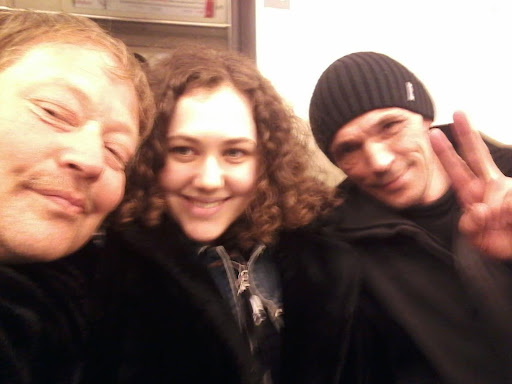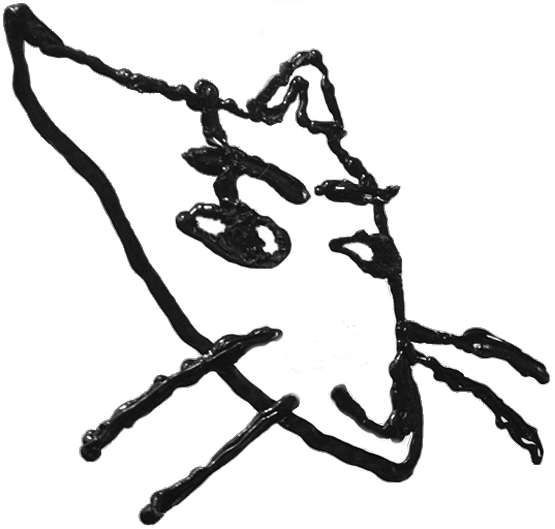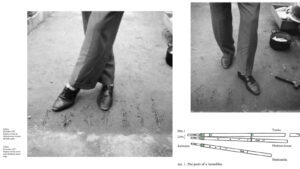For Robert Bird, 1969-2020, my teacher and friend. I miss you.
Chapter 8: Robert
His face swims out of the darkness beyond the library and emerges behind my shoulder before I get a chance to turn around. Startled, I take a step back trying to place him in my mind. We had never met before, but after a few seconds I recognize him from the photographs. “Bet you didn’t expect to find me here,” he says. “I wanted to surprise you.” It is Robert. When I sent him jeans for his release, I worried that he couldn’t possibly fit inside of them. Now I know why he asked for a 72 cm waist.
Perfectly clean, black, pointy shoes into which he changes on entering the library from similarly clean and black sneakers. Narrow suit. But I notice that his face is covered in hard brown patches and his cheeks look as hollow as his chest. I put my arms around him. “I’m so glad you’re here…”
He says little during much of the rehearsal, taking a seat in the corner of the room facing the door. When he reads, he does not start from the beginning of the play where it talks about prison but jumps to a line by Rodney Clemons: “It is not over. I am still on a quest and constantly growing and evolving, and my main motivation is not only to become a free man again but also to be better than when I left society. That’s my motivation.” —“We’re supposed to start from the top,” Yana interrupts gently. — “Yes, but I like this part.”
“Anyone want cookies with the tea?” Robert asks during the break. He seems rather meek for a contract murderer, but what do I know — he is the first one I’ve ever met. Yana announces that the library has no mugs, and so we have to postpone tea and cookies for another time. Robert tries to hide his disappointment, but the wrinkles on his forehead deepen. “I don’t know if there will be another time. But I’ll try though.”
After class, we take the same train home. He starts by taking the seat across the aisle but moves to sit next to me after realizing that we have to scream to hear each other over the roar of the train. Up close, I notice that we are about the same size. “The artists in Tarusa treat me like I’m one of them.” He leans over. “And in Moscow, they trust me too… you do. So I am scared, if I screw up again they’ll say that I wasn’t worth the effort, that I hadn’t changed.” He cracks his knuckles carefully examining each finger. — “Remember the autograph you wrote for me on your book? Everything is just beginning.” — “Yeah,” Robert’s eyes seem to smile back. “Everything is just beginning. We forgot to take a picture together.”
Chapter: 9 Letters from Stateville
In Freedom Words, a Moscow creative writing project for people out of prison, we wrote letters to the writers of Freedom Dreams, a poetry anthology, who were in Stateville, a maximum-security prison in Joliet, Illinois. I translated poems from Freedom Dreams into Russian, and the Moscow participants responded with poems of their own, which I sent to Stateville. These are some of the letters we received:
I’ve been in an epic battle for the last two months over this mail that you sent to me. On February 8th 2019, they brought the mail to my cell as legal mail. They immediately took it back and sent it to internal affairs. They claimed that it wasn’t legal mail. Then, they claimed that they lost it; it fell behind a desk; and that I would get it back soon. After many letters to the warden and many grievances, they finally gave it back to me, today, April 3rd 2019. As soon as I got it, I started to read it and immediately realized that it was well worth the fight.
I really really enjoyed the writings from Russia, the words were very descriptive. I could visualize the seedless fruit as I read the writings. “Watermelons, peaches, tangerines, all without seeds. They have red, salty juice. I try to bite into a piece of fruit without the seeds and shudder.” I also liked, “Nausea overwhelms me. Long and terrible. I think that I am spitting out all of the life that I’ve lived. Feels better. I wash my face.”
I also like how we all see a loss of freedom as a loss of ourselves. Prison and incarceration strips people of their humanity or human colors. I see faded and dim people everyday; not living, just existing. I go through an everyday battle to keep my humanity and self-identity. I’m just another number to this system that tries constantly to project a false identity on me. I love to write songs and writings.
Here is a song that I wrote for Black History Month in 2017. It’s called, “Free Bird”. Chorus: Golden wings, broken cage, I’m free. My soul screams to the sun rays, I see. All my pain is melting. Fly away on the wings of the rain.
Demetrius Cunningham
Projected discharge date: April 4, 2042
Max pen is similar to an unhealthy relationship. When you leave it, you’re forever changed, or shifted open. It’s a lot to unpack. Tell me if you’re a writer too. Isn’t it funny how you can share your truth and someone across the country can find their truth inside of yours? That’s the undeniable power of the art that we love. You can probably tell that my work is incredibly personal. But some of us have to write it out to work stuff out.
I can’t be happy being a good writer. I’m on a quest to be great. All great writing goes deep within yourself and you pull out and share what you find hard to face yourself. Ariella, this is where I ask you again, do you write?
Stay facing your truth
Dustin Sherwood Clay
Projected discharge date: Ineligible
Greetings friends! I am so very delighted to have learned that my writings have moved you to capture and articulate your own understandings or experiences of incarceration with creative writing. In the words of Horace, “adversity has the effect of eliciting talents which in more prosperous circumstances have lain dormant.” Despite the adversities which accompany my incarceration, time here has unlocked my appreciation for all things I would have otherwise taken for granted if I had never been, including, but not limited to, love, life, and freedom.
However, it can be both a blessing and a curse, because as the growth and maturity takes root, the conditions of my incarceration try to rob me of my integrity… my dignity… my humanity. But in adversity a man may be saved by hope! Hence, the reason why I write… to remind myself and whom it may concern that I am human, and in my biggest battle with the most inhuman forms of psychological warfare in a system designed to contain and restrict life.
My friends, my struggle is your struggle is our struggles to love one another as thyself, so it is only righteous that such inspiration is passed on.
Markus Buchanan
Projected discharge date: December 13, 2055
LIBERATION EDUCATION…For this there is no degree needed. No certificates required. As the way one begins to see the world — the way he walks in it — what he leaves behind, will prove that his mind has been liberated. One will be able to see beyond the wall. To visualize the world as an organism that’s capable of change; if we the people set our own hearts and minds on changing it.
So even if you run into a forty-foot wall of Russian resistance don’t become discouraged.
My pen is yours.
Ricky Patterson
Projected discharge date: October 8, 2058
Chapter 10: People vs. Big Black Cars
If Medea were more practical, she would have certainly
Acted differently. After all, Jason was determined
To help her and her children. But Medea is
A woman from Colchis. A savage
By the standard of the Greeks.
This is not just a psychological trait.
It is a consequence of the cultural heritage
In which she was born
And lived.
— Robert
I felt sad because the guard of the library was unfriendly to me. Guarding knowledge, he seemed unwilling to let me in. So instead of studying, I decided to make art. I left the Higher School of Economics and walked down Myastnitskaya street, which means street of the butcher, until I saw the shining spires of the Kremlin.
And I saw a row of cars the said ФГБУ
on their license plates
–which means –
Federal Governmental Governmentally Funded Institution
And I followed them, fascinated by their crimes and the black shells that both concealed and advertised their evil. Hunted them down with my camera. Their backs were glossy beetles. Cousins to the Black Mariahs that Akhmatova cursed when she stood waiting in a line of mothers to visit fatherless sons.
Time to reclaim humanity from the Big Black Cars.
(But the problem is that the people in the Big Black Cars are people)
People who brush their teeth. Who locked my great-grandfather in a box. Who love their children so very much just as he did. A white man walks down the stairs of a blue sky. But Kant says that a person always has a choice even when there is a gun to his head.
Outside the State Duma. There is one or maybe two holding signs. The law requires that if they are more than one then they stand apart one hundred and sixty-four feet.
A Sunny Day on Lubyanka Square
On a day so nice, you almost can’t hear the people screaming.
The only plaque commemorates that here Andropov’s career began.
Can a nation that has no memory of its past have a future?
| כִּי לֹא-אַלְמָן יִשְׂרָאֵל וִיהוּדָה, מֵאֱלֹהָיו–מֵיְהוָה, צְבָאוֹת: כִּי אַרְצָם מָלְאָה אָשָׁם, מִקְּדוֹשׁ יִשְׂרָאֵל. | For neither Israel nor Judah is widowed of God, even though their land is full of guilt against the holy one of Israel. Jerimiah says. |
Jonah fled lest the people of Nineveh were spared. Medea killed her kids to get even. I texted Robert in prison:
— Is it OK to share your review on our public page? It came out really great. Even though Medea is not from Tauris but from Colchis. I also get confused in ancient geography))
— Yes, you can share it. Fix Tauris to say Colchis, then, pls.
. . .
I will try to read what you sent me. Tauris is current day Crimea. At the time, it was part of the Greek speaking world if I am not mistaken. I am sorry. Fix it please. Or else the whole text will look absurd.
That was the day before I learned what Robert had done and that—after twenty years— he was getting out.
Chapter 10: Kindness is irrational*
*A wise teacher once told me to explain what I had gotten wrong.
You see, I opposed your nomination for the grant. Prisons seemed too dangerous for our political status there. You know what I mean. But Marina convinced me. So don’t thank me, it’s all because of Marina.
I drink my grapefruit juice.
Silently.
And the conference hall in DC is too beautiful. If only it were not three floors underground.
— What did you think of the class?
— It was a four out of five.
— Why?
— Cause the girl doing the meditation didn’t know what she was doing.
— Really?
— She told us to hear our knees. She read it wrong.
— What makes you think she didn’t say that on purpose?
— You know, in America you can get fined for performing therapy without a license.
— This isn’t therapy and that’s not true.
— Why do you care about that girl so much anyway, do you know her?
— I met her last week.
— So she got recommended?
— Yeah, she got recommended.
— The class was a mess.
Well, it’s hard to lead a class when it’s made up of people like you.
You think this is the University of Chicago?
— So you don’t want me to come next time?
— That’s exactly why I want you to come.
I’m a difficult student too.
When he let me walk him from Harper to the Medical Center and ask questions about the Greeks, I was surprised because he seemed too old and too wise to have time for me. When he let me buy him coffee, because he had forgotten his wallet, I was surprised because I had thought he was wise. When he told me in the elevator that he was feeble, I was scared, because I needed him to be wise. And then I understood…
Chapter 11: No Exit
For Magdalena, who just got engaged.
When Neil met me at the airport, he was carrying white chrysanthemums.
He took me to my new apartment on Ellis Avenue. At the time, I didn’t yet know how to
get there, but he did. So we went home on the blue line embarrassed and laughing at the
enormity of my bags. Stalks breaking, petals littering the C.T.A. floor.
It is illegal for me to leave Russia. That is, as long as my visa is single entry, if I leave
Russia, I will not be allowed to return. I missed his sister’s wedding and I missed his birthday. Now I am counting the days until a bureaucrat I do not know now stamps approval
of his tourist visa.
Yet this confinement in Russia is so romantic…
As Jamie Redfield once wrote, a wedding ring is a “cave with two exits.” So love might be the confinement that we choose.
— Will it be a while from Domodedovo?
— Yeah, the way isn’t close. It will take a long time.
— Are you messing with me, in order to get more money? I don’t mind if you are.
— That’s nice to hear. But as you can see, I have no reason to mess with you. It is wet outside and the cars keep coming.
— In Rome it was sunny and dry. What evenings!
— You came straight from Rome?
— From an internship. I wish I could stay there for ever, but I had to return home for a long time. It’s always grey in Moscow. That’s why I don’t like it here. Do you?
— I think I do, but if I saw Rome I would probably like it too.
— You have a phone in your hands. What are you waiting for?
— You can’t fly on a telephone.
— Then book a ticket for the next available flight and fly away.
— Someday. But for now I just want to get home from my shift.
In that case the only thing left is to fall in love with Moscow.
– Sveta and Andrei
Freedom Words
10.16.18
But the real decision is what flowers to bring when I take him home from the airport.
Chapter 12: Tarusa
“It was no big deal to come,” I said dodging Robert’s gratitude. “Only a couple hours on the train.” But I was not being completely honest. We both knew why I had hesitated before promising to visit him in Tarusa. He was gone twenty years.
Robert and I began to exchange letters while he was still in Colony FKU IK-3, squad 5, Novochebksarsks and I had just started Freedom Words. As I talked about the idea of liberation in Plato’s Allegory of the Cave with the participants in Moscow, Robert tuned in from the camp. Taking advantage of his illicit access to the Web, he downloaded Plato and Euripides and tried to participate in our discussions remotely.
Before we met, he wrote a short book by punching the letters into a cellphone. It was called Chuy Valley about his childhood in what is now Kyrgyzstan. He gave me an autographed copy the night at the library. Now I had the chance to meet him in the town to which he had relocated after getting out—Tarusa, exactly 101 km from Moscow, a place where Soviet dissidents were forced to settle when they were barred from the capital. Robert got a job restoring mosaics there.
I was nervous. With Neil as back-up, he had gotten the visa almost seven months ago now, I was not afraid of being physically hurt. But I didn’t know what spiritual demons lay dormant in Robert after all those years. He got angry at me once on New Year’s Eve, when he was inside, angry that he was alone. He was encouraging us to stay at a particular hotel. I couldn’t help thinking about the one he killed.
We met at the bus stop near Tarusa’s only Italian pizza shop. He was nervous too. He spoke quickly, as if trying to catch up on all of the conversations he had missed while he was in the camp. He treated us to slices and raspberry gelato. “The best gelato,” he explained. “It’s extra creamy because they minimize the air between the ice cream molecules.”
Robert took us to the home of Marina Tsvetaeva, one of my favorite poets. He looked carefully at Tsvetaeva’s childhood photographs, her letters, her furniture that remained, and watched me to see my reaction. We stayed for several hours. Then, we walked together to the neighboring village to hear a concern of Mozart and Beethoven—chamber music for wind instruments. Free tickets from Robert, which he earned by restoring the mosaics in the music hall, commissioned by the Tarusa Maecenas who sought to return the village to its former glory. We sat near the front, but Robert was not afraid to take out his phone. He streamed video of the concert to his friends at the penal colony.
We ate more pizza, as Robert’s guests, at the tiny concert hall’s glassed-doored café, the forest visible behind the glass. He didn’t mind that I took off the prosciutto. “You two were brave to come,” he said with a shy smile.
When we began walking back to Tarusa, the shadows had grown longer, but it was not yet dark. The street was bathed in the soft gold light of early spring. It sloped downward dotted by aspens, towards the bank of the Oka river, which we could not yet see. Fenced dachas, first, on either side of us, then, just us and the sky. Time seemed to stop. The three of us walking together and Robert with a new chance at life.
Another day like this will come, perhaps, in twenty-three years. Demetrius will get out in 2042. He was sentenced to 117 years. Marchus in 2055. Ricky in 2058. Dustin is ineligible for parole.




